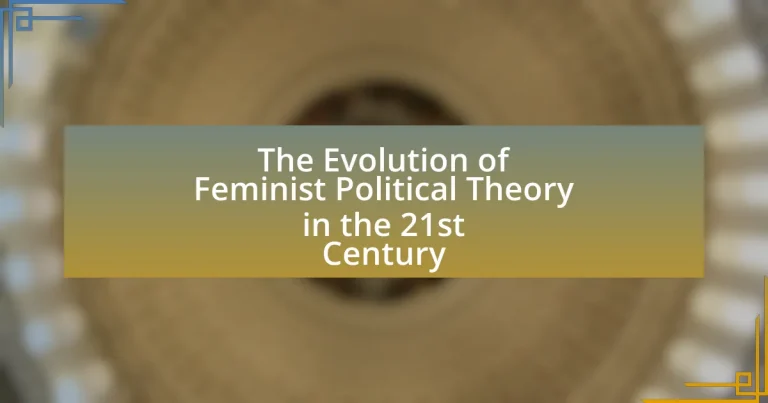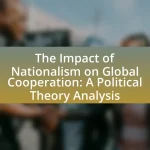The article examines the evolution of feminist political theory in the 21st century, highlighting key developments such as intersectionality, transnational feminism, and ecofeminism. It discusses how contemporary feminist thought has shifted to include diverse perspectives, addressing systemic inequalities and the complexities of identity. Key events like the #MeToo movement and the Women’s March are analyzed for their impact on feminist discourse, while the article also explores the relationship between feminist theory and other political ideologies, as well as the challenges faced by the movement today. Additionally, it emphasizes the importance of grassroots organizations and social movements in shaping feminist political theory and advocates for inclusive approaches to address contemporary issues.
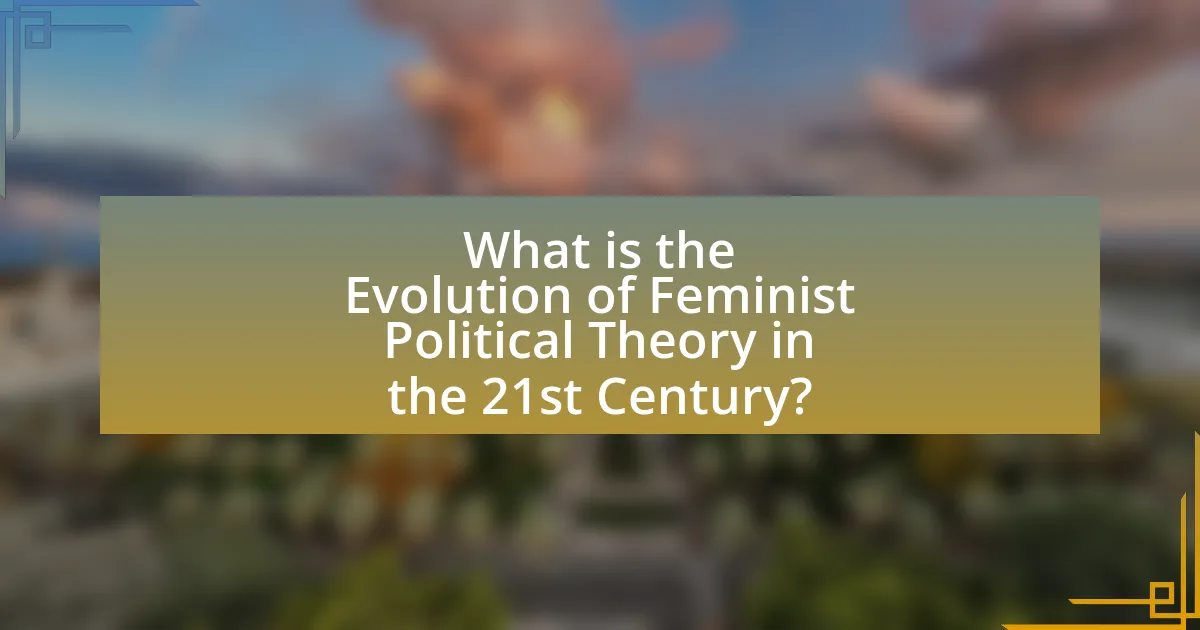
What is the Evolution of Feminist Political Theory in the 21st Century?
The evolution of feminist political theory in the 21st century has been characterized by a diversification of perspectives, including intersectionality, transnational feminism, and ecofeminism. Intersectionality, a term coined by Kimberlé Crenshaw, emphasizes the interconnectedness of social categorizations such as race, class, and gender, which has led to a more nuanced understanding of women’s experiences and oppression. Transnational feminism critiques Western-centric views and highlights the importance of global contexts in feminist discourse, addressing issues like colonialism and globalization. Ecofeminism links environmental concerns with feminist issues, advocating for sustainable practices that consider both gender and ecological justice. These developments reflect a broader recognition of the complexity of identity and the need for inclusive approaches in feminist political theory.
How has feminist political theory changed in the 21st century?
Feminist political theory has evolved significantly in the 21st century by increasingly incorporating intersectionality, which examines how various social identities such as race, class, and sexuality intersect with gender. This shift reflects a broader understanding that women’s experiences and struggles are not monolithic but are shaped by multiple, overlapping factors. Scholars like Kimberlé Crenshaw have emphasized the importance of this framework, highlighting that traditional feminist theories often overlooked the complexities of marginalized women’s experiences. Additionally, contemporary feminist political theory has expanded its focus to include global perspectives, addressing issues such as transnational feminism and the impact of globalization on women’s rights. This evolution demonstrates a commitment to inclusivity and a recognition of diverse voices within the feminist movement.
What key events have influenced this evolution?
Key events that have influenced the evolution of feminist political theory in the 21st century include the global #MeToo movement, which began in 2017, highlighting sexual harassment and assault, and the Women’s March in 2017, which mobilized millions against misogyny and inequality. These events have galvanized public discourse around gender issues, leading to increased academic and political engagement with feminist theories. Additionally, the rise of intersectionality, articulated by scholars like Kimberlé Crenshaw, has reshaped feminist thought by emphasizing the interconnectedness of race, class, and gender. These events collectively reflect a shift towards a more inclusive and diverse understanding of feminism in contemporary political theory.
How do contemporary issues shape feminist political theory today?
Contemporary issues significantly shape feminist political theory today by addressing intersectionality, systemic inequality, and global movements for social justice. Feminist political theorists incorporate the complexities of race, class, gender, and sexuality into their analyses, reflecting the diverse experiences of women and marginalized groups. For instance, the #MeToo movement has prompted a reevaluation of power dynamics and sexual violence, influencing theoretical frameworks that advocate for accountability and systemic change. Additionally, climate change and economic disparities are increasingly recognized as feminist issues, as they disproportionately affect women, particularly in developing countries. This integration of contemporary challenges into feminist political theory underscores its adaptability and relevance in addressing the evolving landscape of social justice.
What are the main schools of thought within 21st-century feminist political theory?
The main schools of thought within 21st-century feminist political theory include intersectionality, postcolonial feminism, ecofeminism, and transnational feminism. Intersectionality, introduced by Kimberlé Crenshaw, emphasizes the interconnectedness of social categorizations such as race, class, and gender, affecting individuals’ experiences of oppression. Postcolonial feminism critiques the ways in which Western feminism can overlook the experiences of women in postcolonial contexts, highlighting the need for a more global perspective. Ecofeminism links environmental issues with feminist concerns, arguing that the exploitation of women and nature is interconnected. Transnational feminism focuses on the global dimensions of women’s rights and activism, advocating for solidarity across borders. Each of these schools addresses specific dimensions of gender inequality and seeks to broaden the understanding of feminist political theory in contemporary contexts.
What distinguishes liberal feminism from radical feminism in this context?
Liberal feminism is distinguished from radical feminism primarily by its focus on achieving gender equality through legal and political reforms within existing societal structures, while radical feminism seeks to fundamentally change those structures to eliminate patriarchy. Liberal feminists advocate for equal rights, access to education, and workplace equality, emphasizing individual empowerment and reformist strategies. In contrast, radical feminists argue that systemic change is necessary to dismantle the patriarchal systems that perpetuate gender inequality, often critiquing the very foundations of societal norms and institutions. This distinction highlights the differing approaches to feminism’s goals and methods in the context of the 21st century.
How do intersectionality and postcolonial feminism contribute to the discourse?
Intersectionality and postcolonial feminism significantly enrich the discourse by highlighting the interconnectedness of various social identities and the impact of colonial histories on gender experiences. Intersectionality, introduced by Kimberlé Crenshaw, emphasizes that individuals experience multiple, overlapping forms of discrimination, such as race, class, and gender, which cannot be understood in isolation. This framework allows for a more nuanced analysis of power dynamics and social injustices, as evidenced by studies showing that women of color face unique challenges that differ from those experienced by white women.
Postcolonial feminism critiques the ways in which Western feminist narratives often marginalize the voices and experiences of women from formerly colonized nations. It underscores the importance of considering historical and cultural contexts in understanding gender issues, as demonstrated by scholars like Chandra Talpade Mohanty, who argue that Western feminism can perpetuate colonial attitudes by generalizing the experiences of women globally. Together, these frameworks foster a more inclusive feminist discourse that acknowledges diverse experiences and challenges the dominant narratives within feminist theory.
What role do social movements play in the evolution of feminist political theory?
Social movements are crucial in shaping the evolution of feminist political theory by providing a platform for collective action and discourse that influences theoretical frameworks. These movements, such as the Women’s Liberation Movement and the #MeToo movement, have highlighted issues like gender inequality, sexual harassment, and reproductive rights, prompting theorists to address these concerns within feminist political discourse. For instance, the activism surrounding the Women’s March in 2017 galvanized discussions on intersectionality, leading to a more nuanced understanding of how race, class, and sexuality intersect with gender. This dynamic interaction between activism and theory ensures that feminist political theory remains relevant and responsive to the lived experiences of women, thereby continuously evolving to address contemporary challenges.
How have movements like #MeToo and Black Lives Matter influenced feminist thought?
Movements like #MeToo and Black Lives Matter have significantly influenced feminist thought by highlighting the intersectionality of gender, race, and social justice. These movements have brought attention to the systemic nature of oppression, emphasizing that issues of sexual harassment and racial inequality are interconnected. For instance, the #MeToo movement, which gained prominence in 2017, has exposed the prevalence of sexual violence against women, particularly women of color, thereby reinforcing the need for an inclusive feminist framework that addresses multiple forms of discrimination. Similarly, Black Lives Matter has underscored the unique challenges faced by Black women, advocating for a feminist perspective that recognizes the importance of race in discussions about gender equality. This intersectional approach has led to a broader understanding of feminism that seeks to dismantle various forms of oppression, making feminist thought more relevant and responsive to contemporary social issues.
What impact do grassroots organizations have on feminist political theory?
Grassroots organizations significantly influence feminist political theory by providing a platform for marginalized voices and fostering community engagement. These organizations challenge traditional power structures and advocate for intersectionality, emphasizing the importance of race, class, and sexuality in feminist discourse. For instance, the Women’s March, which began in 2017, mobilized millions globally, highlighting issues such as reproductive rights and racial justice, thereby reshaping feminist political agendas. Additionally, grassroots activism has led to the incorporation of diverse perspectives in feminist theory, as seen in the works of scholars like Kimberlé Crenshaw, who introduced the concept of intersectionality, illustrating how overlapping identities affect experiences of oppression. This evolution reflects a shift towards a more inclusive and representative feminist political theory in the 21st century.
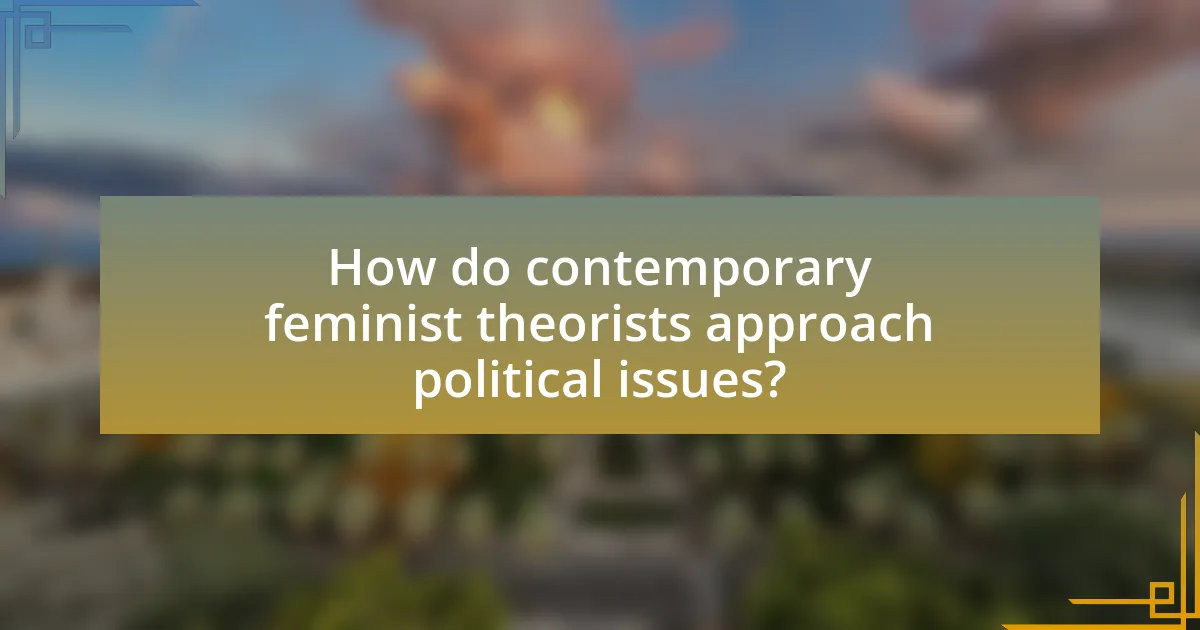
How do contemporary feminist theorists approach political issues?
Contemporary feminist theorists approach political issues by emphasizing intersectionality, which recognizes how various social identities such as race, class, gender, and sexuality intersect to shape individual experiences and systemic inequalities. This approach critiques traditional political frameworks that often overlook the complexities of marginalized groups. For instance, scholars like Kimberlé Crenshaw have highlighted how legal and political systems can perpetuate discrimination against women of color, demonstrating that a one-size-fits-all approach to feminism fails to address the unique challenges faced by these individuals. Additionally, contemporary feminist theorists advocate for inclusive policy-making that incorporates diverse voices and experiences, aiming to create equitable solutions that address the needs of all women, particularly those from underrepresented communities.
What are the key political issues addressed by feminist theorists today?
Key political issues addressed by feminist theorists today include gender-based violence, reproductive rights, intersectionality, and economic inequality. Gender-based violence remains a critical concern, with statistics indicating that one in three women globally experience physical or sexual violence in their lifetime. Reproductive rights are also a focal point, as access to safe abortion and contraception continues to be contested in many regions. Intersectionality, a concept introduced by Kimberlé Crenshaw, emphasizes the need to consider how various forms of discrimination overlap, affecting women differently based on race, class, and sexuality. Economic inequality is highlighted through data showing that women, particularly women of color, earn significantly less than their male counterparts, with the gender pay gap persisting across various sectors. These issues reflect the ongoing struggle for equality and justice within feminist political theory in the 21st century.
How do feminist theorists analyze issues of reproductive rights?
Feminist theorists analyze issues of reproductive rights by emphasizing the intersection of gender, autonomy, and social justice. They argue that reproductive rights are fundamental to women’s freedom and equality, asserting that control over one’s body is essential for achieving gender parity. For instance, scholars like Judith Butler and bell hooks highlight how societal norms and policies can restrict women’s reproductive choices, linking these restrictions to broader systems of oppression. Additionally, feminist theorists advocate for comprehensive access to reproductive healthcare, arguing that disparities in access disproportionately affect marginalized communities, thereby reinforcing existing inequalities. This analysis is supported by data showing that restrictive reproductive policies can lead to negative health outcomes for women, particularly those from low-income backgrounds.
What perspectives do they offer on gender-based violence?
Feminist political theory in the 21st century offers critical perspectives on gender-based violence, emphasizing its systemic nature and the intersectionality of oppression. Scholars argue that gender-based violence is not merely an individual issue but a societal problem rooted in power imbalances and cultural norms that perpetuate inequality. For instance, the United Nations reports that one in three women globally experiences physical or sexual violence, highlighting the pervasive nature of this issue. Additionally, feminist theorists advocate for comprehensive policy changes and societal shifts to address the root causes of gender-based violence, including economic inequality and patriarchal structures. These perspectives underscore the necessity of viewing gender-based violence through a lens that considers race, class, and sexuality, thereby promoting a more inclusive and effective approach to prevention and intervention.
How do feminist political theories intersect with other political ideologies?
Feminist political theories intersect with other political ideologies by challenging traditional power structures and advocating for gender equality within various frameworks, such as liberalism, socialism, and post-colonialism. For instance, liberal feminism aligns with liberalism by emphasizing individual rights and equal opportunities, while socialist feminism critiques capitalism for perpetuating gender inequalities, arguing that economic structures must be transformed to achieve true gender equity. Additionally, post-colonial feminism intersects with anti-colonial ideologies, highlighting how race and class intersect with gender, thus broadening the understanding of oppression beyond Western-centric perspectives. This intersectionality is crucial for addressing the complexities of women’s experiences across different socio-political contexts.
What is the relationship between feminism and socialism in the 21st century?
Feminism and socialism in the 21st century are interconnected movements that advocate for social justice, equality, and the dismantling of patriarchal and capitalist structures. Feminism seeks to address gender inequalities, while socialism emphasizes economic equity and collective ownership. The relationship is evident in the rise of intersectional feminism, which incorporates socialist principles to challenge both gender and class oppression. For instance, many contemporary feminist theorists argue that capitalism exacerbates gender inequalities, as seen in wage gaps and labor exploitation. This alignment is further supported by movements like the Women’s March and various socialist feminist organizations that promote policies such as universal healthcare and paid family leave, highlighting the necessity of economic reforms to achieve gender equality.
How does feminist political theory engage with environmentalism?
Feminist political theory engages with environmentalism by highlighting the interconnectedness of gender, ecology, and social justice. This engagement emphasizes how environmental degradation disproportionately affects women, particularly in marginalized communities, due to existing power dynamics and social inequalities. For instance, research by Vandana Shiva illustrates that women in developing countries often bear the brunt of environmental crises, as they are primarily responsible for securing water, food, and energy for their families. Additionally, feminist political theorists advocate for inclusive environmental policies that consider women’s perspectives and experiences, arguing that sustainable solutions must address both ecological and gender injustices. This intersectional approach is crucial for creating equitable environmental practices that benefit all members of society.
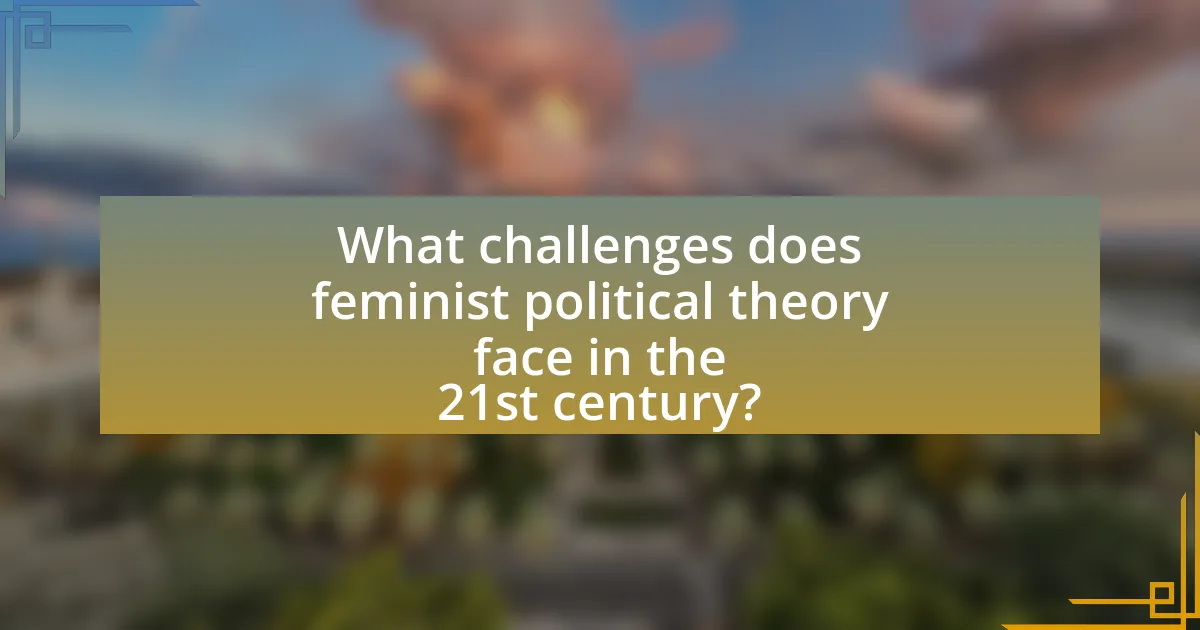
What challenges does feminist political theory face in the 21st century?
Feminist political theory in the 21st century faces several significant challenges, including intersectionality, backlash against feminist movements, and the rise of digital activism. Intersectionality, a concept introduced by Kimberlé Crenshaw, highlights the need to address multiple, overlapping social identities and their impact on experiences of oppression, which complicates the feminist agenda. Additionally, there has been a notable backlash against feminist movements, evidenced by the resurgence of anti-feminist rhetoric and policies in various countries, undermining progress made in gender equality. Furthermore, the rise of digital activism presents both opportunities and challenges; while it allows for broader engagement, it also leads to fragmentation and the potential for misinformation, complicating unified feminist discourse. These challenges require feminist political theory to adapt and evolve to remain relevant and effective in addressing contemporary issues.
What criticisms are directed at contemporary feminist political theory?
Contemporary feminist political theory faces several criticisms, primarily regarding its perceived lack of inclusivity and intersectionality. Critics argue that many contemporary feminist frameworks often center the experiences of white, middle-class women, neglecting the diverse realities of women from different racial, economic, and cultural backgrounds. This critique is supported by scholars like Kimberlé Crenshaw, who introduced the concept of intersectionality, highlighting how overlapping social identities can lead to unique forms of discrimination that are often overlooked in mainstream feminist discourse. Additionally, some theorists contend that contemporary feminist political theory can be overly focused on individual empowerment rather than systemic change, which may limit its effectiveness in addressing broader societal issues.
How do critics argue against the effectiveness of feminist political strategies?
Critics argue against the effectiveness of feminist political strategies by asserting that these approaches often prioritize the experiences of a limited demographic, primarily white, middle-class women, thereby marginalizing the voices of women of color and those from lower socioeconomic backgrounds. This critique is supported by scholars like Kimberlé Crenshaw, who introduced the concept of intersectionality, highlighting that feminist strategies can overlook the complexities of identity and systemic oppression. Furthermore, critics contend that feminist political strategies sometimes focus excessively on legislative reforms rather than addressing deeper cultural and societal norms, which can limit their overall impact on gender equality. This perspective is reinforced by empirical studies indicating that while legal advancements have been made, societal attitudes and behaviors often remain resistant to change, undermining the effectiveness of these strategies in achieving comprehensive gender equity.
What internal divisions exist within feminist political movements?
Internal divisions within feminist political movements include differences in ideology, race, class, and sexuality. These divisions manifest in various feminist schools of thought, such as liberal feminism, radical feminism, intersectional feminism, and ecofeminism, each prioritizing different issues and strategies. For example, intersectional feminism emphasizes the importance of considering how overlapping identities, such as race and class, impact women’s experiences, while liberal feminism focuses on legal equality and individual rights. Historical context shows that these divisions have led to debates over priorities and methods, as seen in the second-wave feminist movement of the 1960s and 1970s, which often marginalized the voices of women of color and working-class women.
How can feminist political theory adapt to modern challenges?
Feminist political theory can adapt to modern challenges by integrating intersectionality, which recognizes the interconnected nature of social categorizations such as race, class, and gender. This approach allows feminist theorists to address the complexities of oppression faced by diverse groups of women in contemporary society. For instance, Kimberlé Crenshaw’s work on intersectionality highlights how women of color experience unique forms of discrimination that differ from those faced by white women, thus necessitating a more nuanced understanding of gender politics. Additionally, feminist political theory can engage with digital activism and social media, which have become vital platforms for mobilizing and organizing around feminist issues, as evidenced by movements like #MeToo and Black Lives Matter. These adaptations ensure that feminist political theory remains relevant and responsive to the evolving socio-political landscape.
What strategies can feminist theorists employ to remain relevant?
Feminist theorists can employ intersectionality as a strategy to remain relevant by addressing the diverse experiences of women across different social identities. This approach recognizes that factors such as race, class, sexuality, and ability intersect to shape individual experiences and systemic inequalities. Research by Kimberlé Crenshaw highlights how intersectionality provides a framework for understanding the complexities of oppression, making feminist theory more inclusive and applicable to contemporary issues. Additionally, engaging with digital activism and social media allows feminist theorists to reach broader audiences and mobilize support for gender equality initiatives, as evidenced by movements like #MeToo and Black Lives Matter, which have effectively utilized online platforms to raise awareness and drive change.
How can collaboration with other movements enhance feminist political theory?
Collaboration with other movements can enhance feminist political theory by integrating diverse perspectives and strategies that address intersecting forms of oppression. For instance, alliances with racial justice movements can illuminate how race and gender intersect, leading to a more nuanced understanding of systemic inequalities. Historical examples, such as the collaboration between feminist and civil rights movements in the 1960s, demonstrate that shared goals can amplify advocacy efforts, resulting in significant policy changes like the Civil Rights Act of 1964. This synergy not only broadens the scope of feminist discourse but also fosters solidarity, making feminist political theory more inclusive and effective in addressing contemporary social issues.
What practical steps can individuals take to engage with feminist political theory?
Individuals can engage with feminist political theory by actively reading foundational texts and contemporary works in the field. This includes studying key authors such as Judith Butler, bell hooks, and Angela Davis, whose writings provide critical insights into gender, power, and social justice. Participating in discussions, workshops, or courses focused on feminist theory can further enhance understanding and application of these concepts. Additionally, individuals can support feminist organizations and initiatives, thereby contributing to practical advocacy and policy change. Engaging in social media platforms and online forums dedicated to feminist discourse also allows for the exchange of ideas and perspectives, fostering a broader community of understanding.
